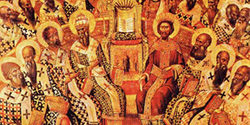
Studying the Church Fathers
This week marks the beginning of a new academic year at Southeastern Baptist Theological Seminary. Every semester, I teach at least one section of Church History I and at least one section of Church History II. The latter is my wheelhouse—my areas of expertise are Baptist historical theology and twentieth century fundamentalism and evangelicalism. But I really love teaching Church History I, especially the Patristic Era (ca. 100–600 AD). Over the past five years, I’ve experienced an ever-deepening respect for the Church Fathers.
My experience isn’t unique. North American evangelicals have evidenced a renewed interest in the Church Fathers for about a generation. Though not all evangelicals draw upon the Patristic Era in ways I would consider healthy and helpful, as a general rule I think the more we read and reflect upon the Church Fathers, the better. I find them to be an antidote for the chronological snobbery and outright faddishness that characterizes the reading habits of many contemporary evangelicals. (See Matthew Mason’s similar thoughts in a recent blog post at the Society for the Advancement of Ecclesial Theology.)
In my second lecture in Church History I, I try to briefly make the case for why a classroom full of mostly Southern Baptist seminarians need to drink deeply from the Church Fathers. After interacting with a helpful blog post from Carl Trueman on this topic, I make several reading recommendations to my students. I thought I’d share them with you, since its likely at least some of this blog’s readers have had minimal exposure to the Church Fathers.
If you are a Patristic neophyte and want to read more about the Church Fathers, I’d recommend two recent introductions: Michael A. G. Haykin, Rediscovering the Church Fathers: Who They Were and How They Shaped the Church (Crossway, 2011) and Bryan M. Litfin, Getting to Know the Church Fathers: An Evangelical Introduction (Brazos, 2007). For a provocative book that makes the case for why evangelicals should read the Church Fathers, see D. H. Williams, Retrieving the Tradition and Renewing Evangelicalism: A Primer for Suspicious Protestants (Eerdmans, 1999). I don’t track with Williams on every point, but I greatly appreciate his broader argument.
Of course, reading the Church Fathers is infinitely better than reading about them. There are all kinds of great primary sources that ought to be read, but I recommend starting with the following three: Athanasius, On the Incarnation; Irenaeus, Demonstration of the Apostolic Preaching; Augustine, Confessions. Each of these works are available in multiple print editions and are also available on several websites free of charge. My students frequently read one or more of these works as part of the class.
There are two different reference sets that I’ve found very helpful in my own preaching and teaching, both of which are edited by Tom Oden and published by IVP Academic. The Ancient Christian Commentary Seriesand The Ancient Christian Doctrine Series are valuable compilations of Patristic writings on biblical texts and theological topics, respectively. IVP Academic also publishes the Ancient Christian Texts Series, but I confess I’m less familiar with this particular resource.
I know that I’m just scratching the surface of the helpful resources that are out there. I’ve got a shelf full of other helpful books that I’ve enjoyed (the works of Chris Hall, Robert Louis Wilken, Brad Green, John Behr, and my SEBTS colleague Steve McKinion come immediately to mind). It’s also entirely possibly I didn’t recommend your favorite Patristic primary source—there are so many good ones. But remember I’m making introductory recommendations to seminarians, a majority of whom have virtually no previous interaction with the Church Fathers. You’ve got to start somewhere. In my mind, when it comes to recommendations in a survey course, Athanasius comes before Dionysius the Aeropagite and Bryan Litfin comes before Lewis Ayres.
I’m thankful for the trend toward Patristic ressourcement among evangelicals. My own Southern Baptist tradition, with its historic tendencies toward insularity and sectarianism, has much to learn from the Church Fathers. I hope a rising generation of pastors and other Christian leaders will agree with what retired Southern Seminary church historian Glenn Hinson used to tell his classes: all of church history is our history. Assuming this is true (and I think it is), if we want to learn more about our history, the best place to start is the (almost) beginning—with the Church Fathers.
Nathan Finn (Ph.D., Southeastern Baptist Theological Seminary) is Associate Professor of Historical Theology and Baptist Studies at Southeastern Baptist Theological Seminary and an ordained Southern Baptist minister. Nathan is married to Leah and they are the parents of three children. The Finns are members of the First Baptist Church of Durham, where Nathan teaches theology classes and serves as a deacon. Nathan loves teaching at Southeastern because he enjoys showing students how church history applies to gospel ministry in the 21st century and why our historic Baptist identity is a heritage worth preserving. Nathan has contributed chapters to Calvinism: A Southern Baptist Dialogue (B&H) and Southern Baptist Identity: An Evangelical Denomination Faces the Future (Crossway). He also blogs at OneBaptistPerspective.

